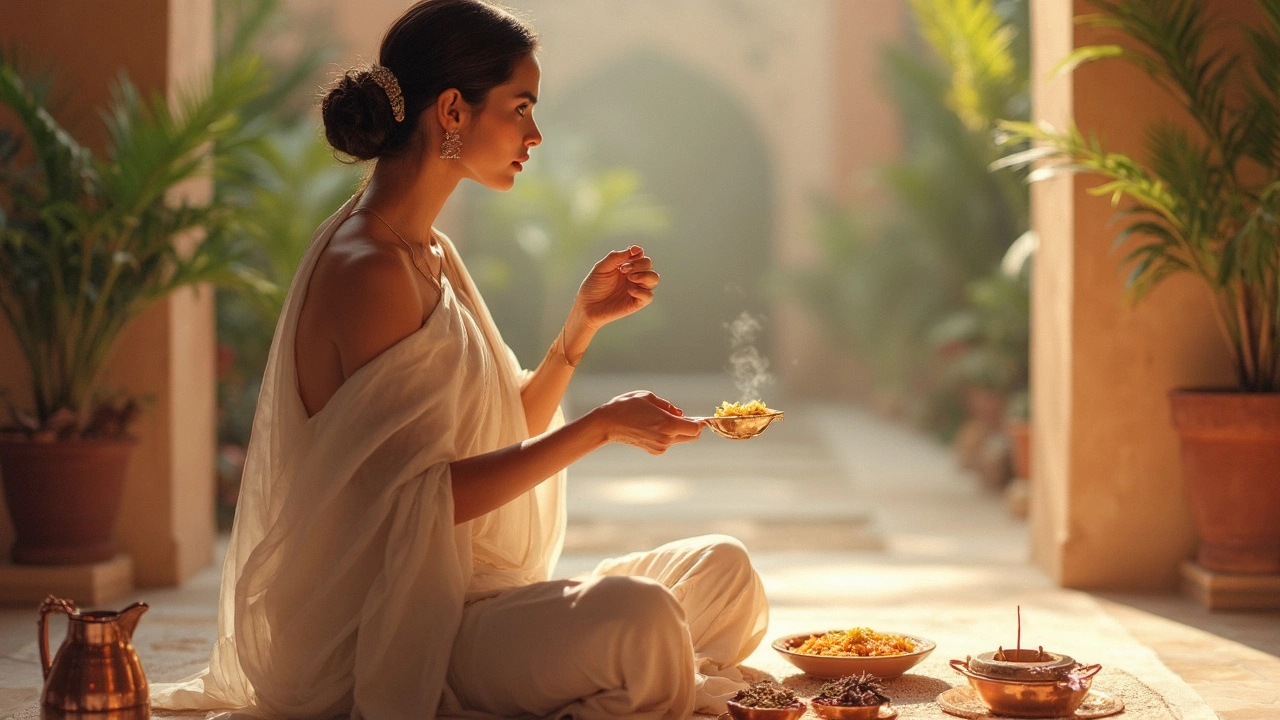Understanding the 80/20 Rule in Ayurveda for Better Health and Balance
 Jun, 24 2025
Jun, 24 2025
Picture this: you’re staring at your plate, wondering if that extra roti or creamy dessert is a crime against your health. Or maybe you’re stressed about remembering every detail of your supposed-to-be perfect wellness routine. Turns out, Ayurveda, one of the oldest health systems in the world, might just give you permission to loosen up. Here’s a surprise: Ayurveda isn’t about neon green smoothies, obscure powders, or rigid diets. Its golden rule for daily life, the 80/20 rule, is about being smart—not obsessive.
What Does the 80/20 Rule in Ayurveda Really Mean?
The 80/20 rule isn’t something new from Silicon Valley, nor did some influencer cook it up after a yoga retreat. This idea pops up in lots of places—business, productivity, and even relationships—but in Ayurveda, it takes on a unique twist. Simply put, it means most of what you do (about 80%) should follow Ayurvedic principles: eat wholesome foods, keep routines, balance your mind and body. The other 20%? That’s life’s wild card—the unexpected birthday cake, late-night chips, or skipping your morning walk because you needed extra sleep.
Ayurvedically speaking, if you stick to good habits most days, your body has the strength to handle occasional slip-ups. This approach is rooted in the science of balance—Ayurveda calls it “samatva.” Unlike strict diets or alarmist wellness trends, Ayurveda believes flexibility is part of health. Rigid routines can actually do more harm than good by spiking anxiety, leading to guilt and a spiral of stress eating or total burnout. Studies from Indian researchers, like the 2020 AYUSH survey, have shown that those who try to follow Ayurvedic routines but allow grace for social life and enjoyment, report better mental health and digest food better too.
What makes the 80/20 approach stand out in Ayurveda is that it’s not about perfection. It’s about trusting your body’s resilience. If you’ve ever felt defeated for missing a meditation session or snacking on something salty, this rule gently reminds you: progress beats perfection. The aim is to make healthy living less overwhelming—and more human.
How Do You Apply the 80/20 Rule in Everyday Ayurvedic Living?
So how does this rule work in actual life, especially if you’re not a yoga teacher or an herbal tea fanatic? Let’s break it down into food, daily routines, and mindset. When it comes to eating, Ayurveda places major emphasis on digestion. A golden rule is to fill your stomach just 80%—leave that last 20% empty. This gives your stomach space for digestive processes and prevents overeating. In practice, this means paying attention to hunger signals rather than counting calories or tracking macronutrients. According to a 2019 study from Kerala’s Centre for Ayurvedic Studies, people who left a bit of space during meals experienced less bloating and felt lighter afterwards.
This 80/20 dynamic isn’t just about meal size. It’s the big-picture pattern of your choices. You eat mindfully at breakfast, but say yes to biryani at a wedding; you rise early and do your yoga most days, but late nights or lazy Sundays don’t throw you into panic. It’s not a license to go wild—consistency still matters. The trick is to anchor your daily life in routines: eat at regular times, choose whole foods, get proper sleep, and move your body. If you’re winning on most days, the odd treat or skipped step won’t undo all your good work.
Here’s a practical tip: batch prep your lunches and keep soothing teas (like ginger or cumin) on hand, but don’t stress if one meal comes out of a takeaway box. Focus on building habits you can repeat, not a schedule that only works when life is quiet. Try to walk for ten minutes outdoors after lunch, but don’t feel bad if rainy Birmingham days keep you in. Ayurveda has long encouraged us to adapt to seasons, moods, and age, so this living tradition flexes along with you.
Families in India have used little hacks for generations: eat your meal seated, chew slowly, turn off screens, and stop just before you’re fully full. These rituals ground you, turn meals into mindful moments, and (bonus) help you notice flavors and textures. If you’re curious about routines beyond food, Ayurvedic daily practices (dinacharya) like oil massages, tongue scraping, and sun exposure all work best as regular habits—not rigid laws. Do them 80% of the time, see how you feel, skip or change when life pulls you in new directions. The 80/20 approach makes room for your actual life, not just the tidy version in wellness magazines.

Why Is This Ayurvedic Rule Different from Other 80/20 Health Tips?
Maybe you’ve heard of the 80/20 rule in the world of productivity (Pareto Principle)—the idea that 80% of results come from 20% of your actions. Or in dieting, where some websites promise you can slog through a “clean” diet most of the week and binge on whatever you want two days a week. Ayurveda’s take, though, is more nuanced. Here, the focus isn’t just output or hacking your willpower. It’s about long-term balance in every sense—digestive, emotional, physical.
Let’s talk history for a second. Ayurveda originates from classic Sanskrit texts like Charaka Samhita (written more than 2,000 years ago) which say, “Everything in moderation, even moderation.” This isn’t some hashtag wellness trend, but an idea proven in real-life communities for generations. Strict rules often fizzle out, especially when daily routines clash with social lives or emotional ups and downs. Diets that cut out entire food groups or demand perfection crack at the first sign of a family visit or night out with friends.
Ayurveda respects life as it is in the real world. You can take inspiration from seasonal eating: in summer, cool foods and midday meals suit most people, while winters call for richer, warming dishes at regular times. If your body stays out of balance due to rigid routines, Ayurveda encourages switching things up—have lighter meals during stressful times, or rest more as life demands.
Another thing—Ayurveda considers food, sleep, and energy (ojas) together, not in isolation. A strict, “no fun” lifestyle depletes joy, which in Ayurvedic wisdom, feeds your vitality. Research published by the All India Institute of Ayurveda in 2023 highlights that enjoyment, laughter, and moderate indulgence help hormones and immunity. So the 80/20 rule isn’t a cheat—it’s baked into the system. Your cravings for a samosa, or a sleep-in, are signals worth respecting, not “failures” to overcome.
Tips to Make the 80/20 Rule Work for You—and Why It Lasts
Ready to give this a shot? Start simple. Make small, steady changes that stick. Here’s a roadmap, not a lecture:
- At every meal, pause halfway through. Ask yourself if you’re actually still hungry. Stop at 80% full.
- Prep your kitchen for easy, healthy choices. Ice a pitcher of cumin water, or keep sesame oil handy for quick massages.
- Automate routines: wake up and sleep at roughly the same time (even on weekends), but don’t panic if one day runs late.
- Circle one meal a week to enjoy your favorite treat—no stress, just presence.
- Bookend your day with two minutes of breathing or gratitude. If you forget, don’t beat yourself up—just start again when you can.
According to longtime Ayurvedic practitioners in the UK (talk to folks at local yoga centers in Birmingham and you’ll hear this firsthand), people see the strongest health changes when they let the 80/20 principle guide—not goad—their daily decisions. It creates a solid structure without boxing you in. Teens and elderly alike adapt these guidelines with ease because it doesn’t demand a total overhaul of daily habits or cause embarrassment in social circles.
There’s a reason Ayurvedic doctors, even in tech-driven cities, tell people to “take it easy.” Burnout, guilt-tripping, and chasing perfect routines rarely work. Instead, people who understand—and truly live—the 80/20 approach trust their instincts and feel calmer about health choices. Their bodies adapt better to new environments, their digestion improves, and their mental sharpness lasts longer.
The real magic in the 80/20 rule isn’t in what you skip; it’s in strengthening your baseline. Anchor your habits, then let life flow in its messy, delightful, unplanned way. And know this: Ayurveda thrives across centuries because it’s practical, not punishing. The 80/20 way means routines are there to guide, not guilt-trip. Even in unpredictable Birmingham weather—or anywhere life happens—this approach keeps you well, yet open to the joy in every day.